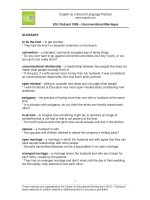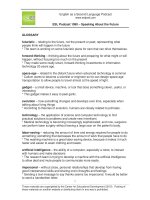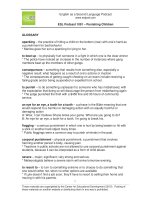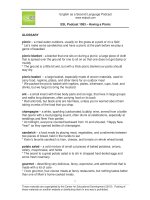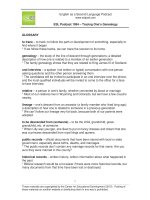ESLPod 1093 guide Want to be Fluent in English?
Bạn đang xem bản rút gọn của tài liệu. Xem và tải ngay bản đầy đủ của tài liệu tại đây (94.37 KB, 10 trang )
English as a Second Language Podcast
www.eslpod.com
ESL Podcast 1093 – Having a Picnic
GLOSSARY
picnic – a meal eaten outdoors, usually on the grass at a park or on a field
* Let’s make some sandwiches and have a picnic at the park before we play a
game of baseball.
picnic blanket – a blanket that one sits on during a picnic; a large piece of cloth
that is spread over the ground for one to sit on so that one does not get damp or
muddy
* The ground is a little bit wet, but with a thick picnic blanket our pants should
stay dry.
picnic basket – a large basket, especially made of woven materials, used to
carry food, napkins, plates, and other items for an outdoor meal
* We packed the picnic basket with napkins, plates, silverware, cups, food, and
drinks, but we forgot to bring the mustard.
ant – a small insect with three body parts and six legs, that lives in large groups
and walks long distances, often carrying food on its back
* Red ants bite, but black ants are harmless, unless you’re worried about them
taking crumbs of the food that you drop.
champagne – a white, sparkling (carbonated; bubbly) wine, served from a bottle
that opens with a loud popping sound, often drunk at celebrations, especially at
weddings and New Year parties
* At midnight, everyone counted backward from 10 and shouted, “Happy New
Year!” as they opened bottles of champagne.
sandwich – a food made by placing meat, vegetables, and condiments between
two pieces of bread, held in the hands to eat
* Karin’s favorite sandwich is ham, cheese, and tomato on whole wheat bread.
potato salad – a cold mixture of small cut pieces of baked potatoes, onions,
celery, mayonnaise, and herbs
* The secret to a great potato salad is to stir in chopped hard-boiled eggs and
some fresh rosemary.
gourmet – describing very delicious, fancy, expensive, and admired food that is
made with a lot of care
* I love gourmet, four-course meals at fancy restaurants, but nothing tastes better
than one of Mom’s home-cooked meals.
1
These materials are copyrighted by the Center for Educational Development (2015). Posting of
these materials on another website or distributing them in any way is prohibited.
English as a Second Language Podcast
www.eslpod.com
ESL Podcast 1093 – Having a Picnic
lavish – luxurious, generous, and expensive
* Those lavish decorations are beautiful, but I prefer a simpler style.
to make do – to be satisfied with what is available, even though it isn’t
everything that one wants; to manage with limited resources; to be able to do
something with less than the ideal amount
* We’ll have to make do with rice and beans until payday, when we can go
grocery shopping again.
corkscrew – a tool that has a spiral-shaped piece of metal and a handle, used to
remove the cork (the piece that goes into the neck of a bottle) from a bottle of
wine
* You won’t need a corkscrew for this bottle of wine, because it has a screw cap.
dishes – plates and bowls, used for eating
* We don’t have enough dishes for a dinner party with more than eight guests.
silverware – forks, knives, and spoons, used for eating
* When placing silverware on the table, the fork should be to the left of the plate,
while the knife and spoon should be to the right.
utensils – tools for doing things, especially in the kitchen; forks, knives, spoons,
tongs, spatulas, and more
* Is it better to cook with metal utensils, since plastic ones could melt?
never mind – a phrase meaning that whatever one was saying is no longer
important, and the other person should just forget about it
* Have you seen my keys? Oh, never mind, I just found them under a pile of dirty
clothes!
it’ll keep – a phrase meaning that something can be done later and does not
need to be dealt with immediately; a phrase used to mean that one will do
something later; a phrase used to mean, “I can tell you about it later”
* I have some really good news to share with you, but I know you’re running late
for work. Go ahead, it’ll keep.
2
These materials are copyrighted by the Center for Educational Development (2015). Posting of
these materials on another website or distributing them in any way is prohibited.
English as a Second Language Podcast
www.eslpod.com
ESL Podcast 1093 – Having a Picnic
COMPREHENSION QUESTIONS
1.
a)
b)
c)
What will they need silverware for?
Champagne
Chicken sandwiches
Potato salad
2.
a)
b)
c)
What could a corkscrew be used for?
To carry the picnic foods
To open the bottle of champagne
To keep the potato salad cold
______________
WHAT ELSE DOES IT MEAN?
to make do
The phrase “to make do,” in this podcast, means to be satisfied with what is
available, even though it isn’t everything that one wants, and to manage with
limited resources: “This apartment isn’t really big enough for a family of seven,
but we’ll have to make do, because we can’t afford anything bigger.” The phrase
“to make up” means to use one’s imagination: “How did you make up such a fun,
creative game?” The phrase “to make up” also means to end an argument and
repair a relationship with someone: “Just buy your wife some flowers and say
you’re sorry so that you two can make up.” Finally, the phrase “to make
(something) out” means to barely be able to see or hear something: “The phone
connection is so poor, I can barely make out what you’re saying.”
dish
In this podcast, the word “dishes” means plates and bowls used for eating: “We
let our children eat out of regular dishes, but our friends only let their kids have
plastic bowls that won’t break if they’re dropped.” The word “dishes” can also
refer to specific foods that are prepared for eating: “Spaghetti, lasagna, ravioli,
and other Italian dishes are Giovanni’s specialty.” A “side dish” is a type of food
that is eaten with the entrée (main food) during a meal, most often a cooked
vegetable or starch: “Ramon is making baked chicken with two side dishes:
creamed spinach and baked potatoes.” Finally, a “satellite dish” is a large,
circular, white piece of metal that is placed outside to receive TV signals from
satellites (machines that orbit around Earth): “The high winds moved our satellite
dish so that we’re no longer able to get a signal.”
3
These materials are copyrighted by the Center for Educational Development (2015). Posting of
these materials on another website or distributing them in any way is prohibited.
English as a Second Language Podcast
www.eslpod.com
ESL Podcast 1093 – Having a Picnic
CULTURE NOTE
Typical Picnic Foods
During the warm summer months, many Americans enjoy having picnics in “the
great outdoors” (nature, not in a building). Simple picnics typically involve
sandwiches, chips, fruit, cookies, and soda, or simply “cheese and crackers” (an
assortments of sliced cheese and/or meats placed on crackers for eating with
one’s hands) and maybe a “veggie tray” (a platter with small pieces of “raw”
(uncooked) vegetables and a “dip” (a thick, flavored liquid that the tips of pieces
of food are placed into before eating). But some picnics are much more
“elaborate” (with many parts or pieces, involving a lot of details and
arrangements).
People who want hot food often bring fried chicken. Typical side dishes might
include potato salad, “coleslaw” (a cold salad made by mixing small pieces of
cabbage and carrot with mayonnaise and herbs), “pasta salad” (a cold mixture of
noodles, vegetables, sauce, and possibly meat), corn bread, and slices of
watermelon.
When a park has “grills” (metal objects that rest over a fire, used to cook foods),
people often bring food to cook there. Hot dogs and hamburgers are “staples”
(very common items), but others cook steaks, fish, or “kebabs” (pieces of food
put onto sticks before they are cooked over a fire).
When many people attend a picnic together, it is usually a “potluck” (an event
where everyone brings food to share), with some people bringing “main dishes”
(entrees) while others bring salads, sides, drinks, or desserts. At these
“gatherings” (when many people meet socially), people usually play baseball,
soccer, or other games before and/or after eating.
______________
Comprehension Questions Correct Answers: 1 – c; 2 – b
4
These materials are copyrighted by the Center for Educational Development (2015). Posting of
these materials on another website or distributing them in any way is prohibited.
English as a Second Language Podcast
www.eslpod.com
ESL Podcast 1093 – Having a Picnic
COMPLETE TRANSCRIPT
Welcome to English as a Second Language Podcast number 1,093 – Having a
Picnic.
This is English as a Second Language Podcast number 1,093. I’m your host, Dr.
Jeff McQuillan, coming to you from the Center for Educational Development in
beautiful Los Angeles, California.
Take a look at our ESL Podcast Business and Daily English Courses. You can
download these courses immediately and start improving your English right
away.
This episode is a dialogue between Bill and Madison about having a picnic –
going out and eating outside somewhere. Let’s get started.
[start of dialogue]
Bill: Surprise! I brought you here to this beautiful spot for a romantic picnic. I have
a very special question to ask you.
Madison: Oh, that’s so sweet. Did you remember to bring a picnic blanket?
Bill: I did. I have everything we’ll need in this picnic basket.
Madison: Don’t put it down there. There are ants. You should put it on the
blanket.
Bill: Yes, you’re right.
Madison: And I hope you remembered to bring something to drink. I’m thirsty.
Bill: I brought both food and a bottle of champagne.
Madison: Well, I hope the food isn’t too cold and the champagne isn’t too warm.
You know how I hate warm champagne.
Bill: Actually, the food is cold, because I brought chicken sandwiches and potato
salad.
Madison: Oh, I thought you would have brought something a little more, well,
gourmet or lavish, something a little special.
5
These materials are copyrighted by the Center for Educational Development (2015). Posting of
these materials on another website or distributing them in any way is prohibited.
English as a Second Language Podcast
www.eslpod.com
ESL Podcast 1093 – Having a Picnic
Bill: That’s why I brought the champagne. It’ll make this picnic extra special.
Madison: I guess we’ll have to make do with warm champagne and sandwiches.
I hope you remembered to bring a corkscrew and some dishes and silverware.
Bill: I bought paper plates and plastic utensils.
Madison: Paper and plastic? I guess we’ll have to make do with those, too. Okay,
now, you said you had a special question you wanted to ask me. What is it?
Bill: Question? Oh, never mind. It’ll keep.
[end of dialogue]
Bill says to Madison, “Surprise! I brought you here to this beautiful spot for a
romantic picnic.” A “spot” (spot) here just means a location or area. Bill has
brought Madison, his wife or girlfriend – maybe it’s the girlfriend and the wife is at
home, I don’t know – to this beautiful spot for a romantic picnic. A “picnic” (picnic)
is a meal that you usually eat in a park or in some nice area. You often sit on the
grass and have a small meal – a lunch, let’s say.
Bill says, “I have a very special question to ask you.” Madison says, “Oh, that’s
so sweet.” If something is “sweet,” it’s nice, or perhaps in this case, “romantic.”
Madison asks, “Did you remember to bring a picnic blanket?” A “blanket”
(blanket) is normally something you put over yourself to keep warm. Here,
however, it’s used to mean something you would put on the ground so that you
don’t have to sit on the dirt or perhaps on the wet grass.
Bill says, “I did,” meaning I did remember. “I have everything we’ll need in this
picnic basket.” A “picnic basket” (basket) is usually a large container in which you
put the items you will need for your picnic. So, you put all of your food and your
plates, your napkins, your knives and forks, if you need them, into this large
container called a “basket.” A picnic basket is used to transport food and other
items needed for a picnic.
Madison tells Bill, “Don’t put it down there. There are ants.” “Ants” (ants) are
small insects that have little body parts and legs that often go after food if it is left
outdoors. Madison is telling Bill not to put the picnic basket in a certain place
because she sees that that place has ants. She says, “You should put it on the
blanket.” Bill says, “Yes, you’re right.” Madison continues, “And I hope you
remembered to bring something to drink. I’m thirsty.”
6
These materials are copyrighted by the Center for Educational Development (2015). Posting of
these materials on another website or distributing them in any way is prohibited.
English as a Second Language Podcast
www.eslpod.com
ESL Podcast 1093 – Having a Picnic
Madison seems to be making a lot of demands on Bill, seems to be asking him
for a lot of things. She says she’s thirsty and therefore hopes that Bill
remembered to bring something to drink for her, of course. Bill says, “I brought
both food and a bottle of champagne.” “Champagne” (champagne) is a white
sparkling wine, a bubbly wine that is from a certain region in France. In order to
be sold as champagne in many countries, it has to be only from that region in
France.
Madison says, “Well, I hope the food isn’t too cold and the champagne isn’t too
warm.” So, already we don’t like Madison, right? I mean, she’s complaining now
that perhaps the food will be cold and the champagne will be warm. Of course
you want the champagne to be cold and, if it’s supposed to be hot, the food to be
warm. She says, “You know how I hate warm champagne.”
Bill says, “Actually, the food is cold, because I brought chicken sandwiches and
potato salad.” Bill is saying that the food is cold but it’s supposed to be cold,
because he brought some chicken sandwiches and potato salad. A “sandwich,”
of course, is a popular food in the United States. It’s made with two pieces of
bread, typically, and in between the two pieces of bread you put meat,
vegetables, and other things to eat.
“Potato salad” is a cold mixture of chopped potatoes – potatoes cut up into small
pieces that have been baked – combined with mayonnaise, typically, onions,
celery, and some other things. Potato salad is a very popular picnic food in the
United States, especially during the summer. Whenever my family would have
big family parties in the summertime, there would always be potato salad.
Madison says, “Oh, I thought you would have brought something a little more,
well, gourmet or lavish, something a little special.” Madison is complaining now
that what Bill brought on this surprise picnic isn’t very “gourmet or lavish.”
“Gourmet” (gourmet) refers to very good tasting food that usually is expensive
and often takes a long time to prepare. The word “lavish” (lavish) as an adjective
means expensive or luxurious. If we are talking about food, “lavish” would be
very expensive, very good-looking and good-tasting food.
Bill says, “That’s why I brought the champagne” – in order to bring something a
little special for the event. “It’ll make this picnic extra special,” he says. Madison
continues complaining, “I guess we’ll have to make do with warm champagne
and sandwiches.” “To make do” is an interesting two-word phrasal verb meaning
to be satisfied with something that isn’t exactly what you want – to be able to get
7
These materials are copyrighted by the Center for Educational Development (2015). Posting of
these materials on another website or distributing them in any way is prohibited.
English as a Second Language Podcast
www.eslpod.com
ESL Podcast 1093 – Having a Picnic
by or to survive through a certain situation not having all of the resources, all of
the things that you would like to have in a perfect world or ideally.
Madison is saying that she and Bill will “have to make do with warm champagne
and sandwiches.” She says, “I hope you remembered to bring a corkscrew and
some dishes and silverware.” A “corkscrew” (corkscrew) is a special tool that you
use to remove the very top of a wine or champagne bottle. Technically, you’re
removing the little piece that is put into the top of the bottle to keep the liquid
inside of it. That little piece is called a “cork,” and hence a corkscrew screws into
or goes into the cork in order to allow you to pull it out.
“Dishes” are, of course, the things that you use for eating – plates and bowls, for
example. We use the term “silverware” to mean the same as “eating utensils” –
that is to say knives, forks, and spoons. Technically, silverware would be eating
utensils made out of or plated with silver, but we use the term more generally to
mean the knives, forks, and spoons that you eat with.
Bill said, “I bought paper plates and plastic utensils.” So, he has plates made of
paper and utensils – that is again a knife, a fork, a spoon – made of plastic,
which is quite common on a picnic. You often bring paper and plastic to eat with.
Madison is not impressed. She says, “Paper and plastic?” She’s not happy. She
continues, “I guess we’ll have to make do with those, too. Okay, now, you said
you had a special question you wanted to ask me. What is it?”
We can guess by now that Bill was going to ask Madison to marry him. He was
going to propose to her. “To propose” here means to ask someone to marry you.
But after all of the questions that Madison has asked, all the complaints that she
has, Bill has decided, we believe, not to ask Madison to marry him. He says,
“Question? Oh, never mind.” “Never mind” is a phrase meaning that whatever
you were talking about is not important and that the other person should just
forget about it.
He says that the question “will keep” (keep). To say something will keep means
that it doesn’t have to be done right now, or it doesn’t have to be talked about
right now. It’s something you can do in the future. Maybe Bill will change his mind
and decide never to ask Madison to marry him. That would be my advice.
Now let’s listen to the dialogue, this time at a normal speed.
[start of dialogue]
8
These materials are copyrighted by the Center for Educational Development (2015). Posting of
these materials on another website or distributing them in any way is prohibited.
English as a Second Language Podcast
www.eslpod.com
ESL Podcast 1093 – Having a Picnic
Bill: Surprise! I brought you here to this beautiful spot for a romantic picnic. I have
a very special question to ask you.
Madison: Oh, that’s so sweet. Did you remember to bring a picnic blanket?
Bill: I did. I have everything we’ll need in this picnic basket.
Madison: Don’t put it down there. There are ants. You should put it on the
blanket.
Bill: Yes, you’re right.
Madison: And I hope you remembered to bring something to drink. I’m thirsty.
Bill: I brought both food and a bottle of champagne.
Madison: Well, I hope the food isn’t too cold and the champagne isn’t too warm.
You know how I hate warm champagne.
Bill: Actually, the food is cold, because I brought chicken sandwiches and potato
salad.
Madison: Oh, I thought you would have brought something a little more, well,
gourmet or lavish, something a little special.
Bill: That’s why I brought the champagne. It’ll make this picnic extra special.
Madison: I guess we’ll have to make do with warm champagne and sandwiches.
I hope you remembered to bring a corkscrew and some dishes and silverware.
Bill: I bought paper plates and plastic utensils.
Madison: Paper and plastic? I guess we’ll have to make do with those, too. Okay,
now, you said you had a special question you wanted to ask me. What is it?
Bill: Question? Oh, never mind. It’ll keep.
[end of dialogue]
Our scriptwriter prepares gourmet English for you each and every episode.
Thank you, Dr. Lucy Tse.
9
These materials are copyrighted by the Center for Educational Development (2015). Posting of
these materials on another website or distributing them in any way is prohibited.
English as a Second Language Podcast
www.eslpod.com
ESL Podcast 1093 – Having a Picnic
From Los Angeles, California, I’m Jeff McQuillan. Thank you for listening. Come
back and listen to us again right here on ESL Podcast.
English as a Second Language Podcast was written and produced by Dr. Lucy
Tse, hosted by Dr. Jeff McQuillan. Copyright 2015 by the Center for Educational
Development.
10
These materials are copyrighted by the Center for Educational Development (2015). Posting of
these materials on another website or distributing them in any way is prohibited.
